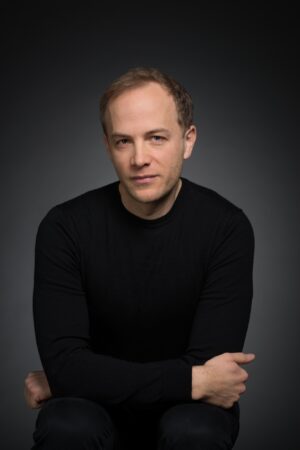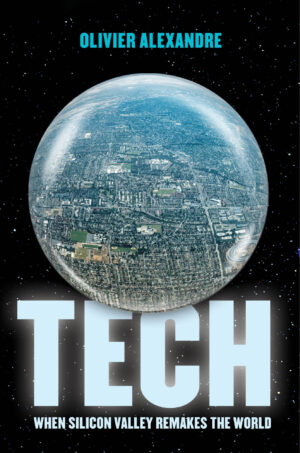Q&A with Olivier Alexandre, author of “Tech”

In Tech: When Silicon Valley Remakes the World, sociologist Olivier Alexandre takes us on a revealing tour of Silicon Valley's prominent personalities and vibrant networks to capture the way its denizens live, think, relate, and innovate.
Embedded deep within the community, Alexandre reports back on the motivations, ambitions, and radical vision guiding tech companies. From the conquest of space to quantum computing, engineers have recast the infinitely large and small. Scientists project the end of death and work to surpass human beings with machines. But at what cost? Alexandre sees a shadow hanging over the Valley, jeopardizing its future and the economy made in its image. Critical yet fair, Tech illuminates anew a world of perpetual revolution.
Olivier Alexandre is Research Fellow at the French National Center for Scientific Research (CNRS), as well as Deputy Director and founding member of its Center for Internet and Society.
What motivated you to write this book?
I started the project almost ten years ago. I was just finishing a book on the French movie industry, and Netflix was launching its service in France. French professionals in the industry have been used to working with Hollywood for more than a century, but they were worried about this new player, coming from northern California. So, I decided to dedicate my postdoctoral period to the company, its business model, organization, and culture. Thanks to Fred Turner, I had the opportunity to spend a year at Stanford, in the heart of Silicon Valley.
When I arrived at SFO airport, I told myself: ok, the most difficult part is behind me. I was so naïve. I knew nothing about tech and Netflix was claiming transparency. Some of their employees published technical articles in open access, the culture company memo was on-line, and their campus at Los Gatos was open too. I went there riding my bike: no fences, walls, security, no high rise.
But if you’re not authorized to step into the building, it’s all you’re going to see. If you want more, you will have to go through the PR team. With several rounds, interviews, and checkouts. It’s a long, painful, time-consuming process. If at the end you’re not allowed to do your study, nobody will let you access the building or talk to you.
I’m an old fashion sociologist. I do field work, interviews with employees, meetings with execs, and so forth. Only high-profile journalists can have this kind of access to large tech companies. But me? A foreigner, complete outsider, who knew nobody in tech, was a nobody, knew nothing about the industry, had no money, no car, no connections, and only broke English? No way. So, I was stuck for a while.
I was also frustrated by not finding at my arrival a book of sociology dealing with Silicon Valley, as a whole. I was desperate about finding such a book. So, I started to wonder: why not try to write this book, which will explain to people how this industry really works and the specific mentality of the workers in it?
You refer to this book as "a slow study of a fast-moving industry." Why is it useful or relevant now?
As a social scientist, when you study tech, there are several pitfalls to avoid. I named them: the mayfly syndrome, the entrepreneurial myth, techno-moralism (could be techno-optimism or technocriticism), and maybe the trickiest one, the Disneyland effect.
The mayfly syndrome is when, like bugs in the night, you are only going after the lights without any consideration of what is around. When you do that, you go after what’s shining at the moment, but what’s shining in tech moves very fast. So, you go from one entrepreneur to another, from a company to another, a service to another and so forth. It’s exciting… But also exhausting. And the risk is to miss the big picture.

The entrepreneurial myth is to believe that at first, entrepreneurs are kind of modern heroes, that like Hercules, Achilles or Atlas (like Ayn Rand referred to entrepreneurs), they were born with supernatural abilities: could be their intelligence, moral force, prescience, technical virtuosity… Name it. But idolizing them, or despising them, won’t help you to answer deeper questions such as: how innovators innovate? Why collectively do we give them such importance? Where do their influence and resources come from? What and how they think?
Then, you have what I call techno-moralism, it means seeing tech through what is right or wrong. It’s human to project values on an object, especially on tech. Especially today. But my experience is that you can’t debate about what’s right and wrong with people. It’s too personal, deeply emotionally and biographically rooted. As a sociologist, I have to find other ways to deal with morality. I can’t say to people what they should think or believe. But what I can do is to explain the values of people inside an industry to people outside. And sometimes I can show where there are some gaps or contradictions between what people claim in the industry and what they really do. So, the book is an attempt to give to the readers the most accessible and fair description of what the Tech industry is about.
Finally, the Disneyland effect. When you are in Silicon Valley you are surrounded by attractions, like tech conferences, network sessions on tech campuses, tech celebrity demos, parties, and so forth. Almost every day, you have disruptive news and announcements, constant controversies between x and y, and running trials in courts. It could be fun, disappointing, vain or exhilarating. But at the end of the day, what would you have learned? What can you use for helping other people to understand this industry and what people feel when they work in it? Well, in a recreation park, you can be a visitor, an employee, the designer, or even the owner of the park. I chose to be an observer and stuck to that position as best as I can, for helping people to understand how the park works, what they want to do in it, and what this role entails.
But for doing so properly, I needed time. My study lasted ten years. I made over 2,000 observations and conducted nearly +150 interviews, trying to cope with the demographics of the population, organizations and technologies. In this lapse of time, some amenities have been replaced or rebranded. When I began, Yahoo! was one of the tech giants, but today it is almost a joke in tech. Nonetheless, the structure of the park, its core-organization, are still the same. In the book, I explain how and why.
What's the future of Silicon Valley?
It’s easy to access the future through Silicon Valley because its path to the future is already there. It has been built for this exact purpose. You just have to use tech services, produced by companies, led by entrepreneurs, backed by venture capitalists, with capital from all other the world and sectors, disrupting increasingly large and distant markets. And if people are unhappy or protest because their conditions and life aren’t getting better like it was promised, well, put some money in large philanthropic programs that will be led and designed by… technologists. Information systems are penetrating every sphere of life based on this logic.
Of course there are challenges for Silicon Valley: bubbles, Chinese competition, American or European regulation… But at the top of it is the fact that the solutions of Silicon Valley have turned to be our problems. Too much information, fake news, obsolete devices, unstable disruption, and services which are not tackling the common problems of the world, like food, energy, environmental and water scarcities. Silicon Valley companies make us believe that we live in an abundance of resources. This is true in terms of information. But science says the exact opposite about natural resources and living ecosystems. Most of Silicon Valley don’t even pay attention to that because they don’t have the time to do so.
Another way to phrase this could be this: what are the alternative worlds that the Silicon Valley model prevents us from exploring? When Sam Altman seeks trillion of dollars for his company or when Elon Musk says that our absolute priority should be Mars, how do their own views of the future and ambitions for their company reduce the scope of our future?
I am not here as a sociologist to say if they are right or wrong. Silicon Valley is extremely efficient. After all these years observing it and studying its history, I still have admiration for the ingenuity of tech people. But by implying that Silicon Valley is the only model to follow, we agree to give Silicon Valley entrepreneurs a monopoly on our futures. And the future is political. So, the question is should we want a democratic way to choose our future or not?
The science fiction writer William Gibson said in the late 1990s that “the future is already there, but it’s not just evenly distributed.” This sentence has been stuck in my head since I read it for the first time.
Learn more about Tech.